

The legacy of South Africa's Freedom Charter 60 years later. On Flipboard. South African e-learning to reach excluded. By Tom Jackson .
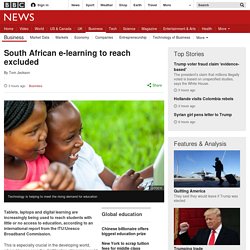
Image copyright iStock Tablets, laptops and digital learning are increasingly being used to reach students with little or no access to education, according to an international report from the ITU/Unesco Broadband Commission. This is especially crucial in the developing world, where Unesco says the digitilisation of learning could be a means of accelerating progress towards the Sustainable Development Goals, such as ensuring access to primary school for all children. This process is already evident in Africa, which according to Unesco has 30 million primary-age children not attending school, over half the global total. Yet the continent is overcoming challenges surrounding lack of internet access and electricity to become a major player in the e-learning space. According to a recent report from Ambient Insights, Africa is the region globally where e-learning revenues are most likely to increase, with South Africa the leading market on the continent. Meeting the demand.
South Africa Has One of the Worst Education Systems. AFTER half an hour of pencil-chewing Lizeka Rantsan’s class lines up at her desk to hand in its maths tests.
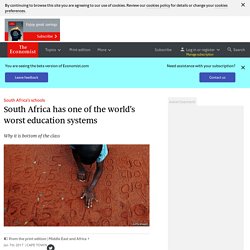
The teacher at Oranjekloof primary school in Cape Town thanks the 11- and 12-year-olds and flicks through the papers. Ms Rantsan sighs, unimpressed. Pulling one sheet of errant scribbles from the pile she asks: “How are we supposed to help these children?” It is a question that South Africa is failing to answer. In a league table of education systems drawn up in 2015 by the OECD club of mainly rich countries, South Africa ranks 75th out of 76. Once Close to Extinction, South Africa's First People Have a New Lease on Life. Who is Steve Biko and why is he so important to South Africa? The Day My Father Lost His Country - The Atlantic. A few days after Donald Trump won the presidency, my father told me a story about his childhood.
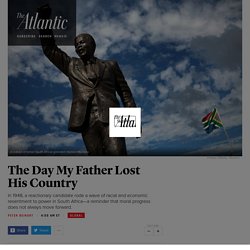
My father grew up in Malmesbury, a rural farming town in South Africa’s Western Cape. His parents were Lithuanian immigrant Jews. Growing up Jewish in Malmesbury was not like growing up in Cape Town or Johannesburg, where Jews were more plentiful and more prosperous, and the surrounding whites were mostly of English descent. My father’s white neighbors, some of whom sent their children to school without shoes, were overwhelmingly Afrikaners. Joburg is 130 years old – this is what it looked like back then. South Africa’s biggest city is celebrating its 130th birthday this month, and has come a long way from a handful of farms digging for gold back in 1886.
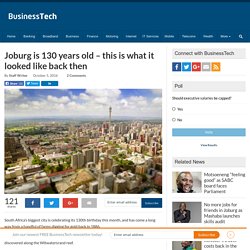
Johannesburg was formally established by the Boer government in 1886, after gold was discovered along the Witwatersrand reef. By the time the Anglo-Boer war kicked off, the city had already grown significantly, with a working railway system, horse-drawn trams and the Johannesburg Stock Exchange (JSE) in full operation. In its earliest days, Joburg was a small grouping of around 9 farms that had acquired claims to dig for gold.
The area, known as Ferreirasdorp today, is the oldest suburbs of Joburg. The Shock of the New. The Heart of Redness By Zakes Mda. 277 pp.
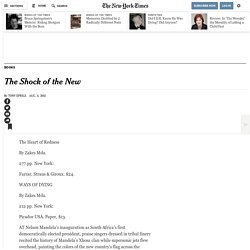
New York: Farrar, Straus & Giroux. $24. 212 pp. The size of an apartheid leader’s statue tells you everything you need to know about race and South Africa — Quartz. What is the significance of a former statesman’s statue?
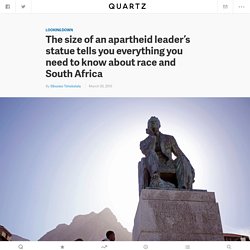
This a question that has been doing the rounds in Cape Town in the last couple of weeks. The statue of General Louis Botha, South Africa’s first colonial prime minister, towers over the entrance of Parliament. Nearby, about 200 metres away, is a far less imposing bust: of Nelson Mandela. Why do all these books about Africa look the same? A cliche grows in Botswana.
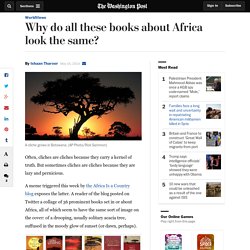
(AP Photo/Rick Sammon) Often, cliches are cliches because they carry a kernel of truth. But sometimes cliches are cliches because they are lazy and pernicious. How the ANC's path to corruption was set in the 1994 transition from apartheid. How world sees SA: A nation losing faith in Zuma's ANC; at a turning point - BizNews.com. The Financial Times of London hasn’t let SA’s municipal elections pass quietly.
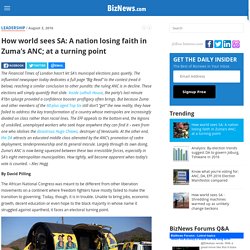
The influential newspaper today dedicates a full page “Big Read” to the contest (read it below), reaching a similar conclusion to other pundits: the ruling ANC is in decline. These elections will simply quantify that slide. Inside Luthuli House, the party’s last minute R1bn splurge provided a confidence booster profligacy often brings. ANC faces losses in vote that could reshape South African politics. 4 Myths about Post-Apartheid South Africa that Most Foreigners Get Wrong. Drone Photos Capture the Stark Divide Between Rich and Poor in South Africa. Forty years after the Soweto uprising, South Africa’s students can still learn its lessons — Quartz. The statistics are well known and they are grave.
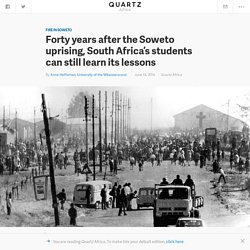
One in four South Africans are unemployed. Even worse, half of all young South Africans are without a job. The numbers only improve when those who have given up the search are excluded from the count. The human faces behind those statistics show just how dire the situation has become. Graduates have taken to street corners begging for work, their resumes and degree certificates often in their backpacks, ready for any opportunity. Mmusi on race: DA leader rolls the dice on SA’s most explosive issue. Helping 'Kliptown' kids take control of their future. Brian Munyai has spent nearly all of his 22 years living in a small metal shack that has never had electricity or running water.
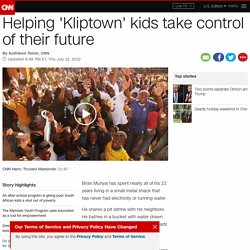
He shares a pit latrine with his neighbors. He bathes in a bucket with water drawn from the communal tap. At night, he reads by an oil lamp. Conditions like this are typical for the nearly 40,000 people who live in the slums of Kliptown, a district in the largely black township of Soweto, South Africa. Generations of families have lived in these ramshackle homes just 15 miles from Johannesburg, the economic capital of the country. The community has long suffered from high rates of unemployment, crime and school dropouts, and the end of apartheid more than two decades ago did little to change the situation.
Nelson Mandela’s ‘I Am Prepared To Die’ speech fifty years on. April 20, 2014, marks the fiftieth anniversary of Nelson Mandela's speech from the dock at Rivonia. What is the legacy of that trial? What does it mean for South Africans and for all those who struggle today? April 20, 2014 marks the fiftieth anniversary of Nelson Mandela’s ‘I am prepared to die’ speech. On this day, fifty years ago, a black man stood in a white man’s court, a court that did not acknowledge or recognise his claims to a life of meaning and purpose, to deliver a robust, uniquely transformative critique of violence and injustice. In this address, Mandela used words and phrases capable of re-inventing the political universe: touchstone phrases that resist what Apartheid affirms; reveal what it hides; and amplify what it silences.
George Bizos: Mandela's trial and tribulations. Nelson Mandela's commitment to the struggle for freedom started more than 15 years before he and many others decided, towards the end of 1961, that peaceful resistance was no longer the only option available to the oppressed people of South Africa. Rivonia: telling it as it was. Rivonia: telling it as it was 2 July 1988. Former CIA spy says he helped South Africa arrest 'communist toy' Nelson Mandela. 51 Years Ago, Nelson Mandela Was Arrested And Charged With Treason. South Africa: 60 Years - How the "Freedom Charter" Betrayed Africans. OpinionBy Motsoko Pheko. Why I call myself a 'coconut' to claim my place in post-apartheid South Africa. Towards the end of 1997, the year before I turned seven and went to big school, I asked: “Mama, at big school next year, can they call me Gloria?” Gloria is my second name.
My mother looked at me, a little confused, and simply said, “No. Your name is Panashe, so they will call you that.” South Africans living in ‘white bubbles’: de Klerk. White South Africans should continue to try and understand and acknowledge the pain and humiliation that apartheid caused black, coloured and Indian people, FW de Klerk said on Tuesday. Colonial legacy of mining pioneers poses a dilemma for South Africans. Hi, my name is Evita and I'm a racist. I watched a film on TV with my grandchildren last night. South Africa debates taboo question: Was Mandela a sellout? JOHANNESBURG, South Africa — Nelson Mandela is known by many epithets: freedom fighter, anti-apartheid hero, global icon.